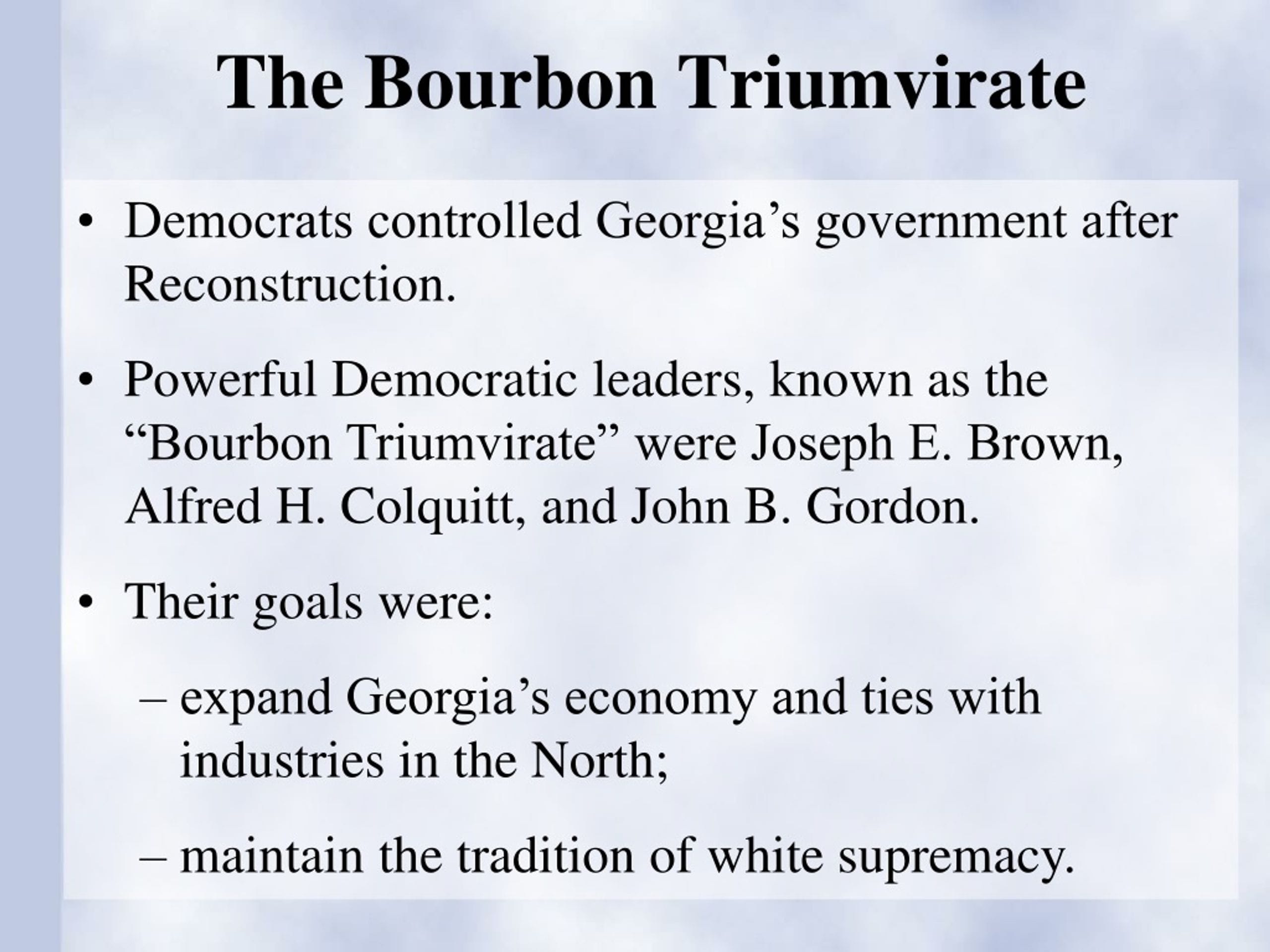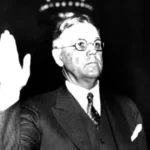Georgia’s Post-Reconstruction Powerbrokers: The Bourbon Triumvirate
Following the Civil War and Reconstruction, Georgia’s political landscape was in a state of flux. Emerging from this turbulent period was the Bourbon Triumvirate, an unofficial alliance of three influential Democrats: Joseph E. Brown, Alfred H. Colquitt, and John B. Gordon. These figures dominated Georgia politics from the 1870s to the 1890s, wielding considerable power and leaving a complex legacy that continues to be debated today. Their influence extended across the state’s economy, society, and political structures, shaping Georgia’s trajectory for decades to come.
Who Were the Members of the Bourbon Triumvirate?
The Bourbon Triumvirate consisted of three prominent Georgians, each with distinct backgrounds and contributions:
Joseph E. Brown: A former Civil War governor, Brown transitioned into a successful industrialist and railroad tycoon. He represented the burgeoning industrial interests of the “New South” and advocated for protectionist tariffs. He also profited from the controversial convict lease system, a practice that allowed businesses to “rent” prisoners for labor. You can learn more about similar industrial figures in the Andrew Carnegie Gospel of Wealth, which explores the intersection of wealth, responsibility, and social impact.
Alfred H. Colquitt: A planter, Confederate general, and U.S. Senator, Colquitt often represented the interests of the old planter class. He favored free trade, which put him at odds with Brown’s protectionist stance. This internal conflict highlights the complexities and occasional tensions within the Triumvirate.
John B. Gordon: A charismatic Confederate general, Gordon served as both governor and U.S. Senator. His Confederate background resonated with many Georgians, and he played a significant role in shaping the state’s political direction during this era. Like Brown, he also benefited from the convict lease system.
The Bourbon Triumvirate’s Goals and Ideology: A “New South” Vision with Old South Tensions
The Bourbon Triumvirate embraced the “New South” ideology, which promoted industrialization, economic diversification, and attracting Northern investment. They envisioned a Georgia transformed into an industrial powerhouse, crisscrossed by railroads and bustling with factories.
However, their progressive economic vision coexisted with deeply conservative social views. They were staunch proponents of white supremacy and actively worked to maintain the existing racial hierarchy. This resulted in limited opportunities for Black Georgians, who faced widespread discrimination in education, voting rights, and nearly every facet of life. The convict lease system, from which Brown and Gordon profited, exemplifies the exploitative practices that targeted Black communities.
The Rise and Fall of the Bourbon Triumvirate
The Triumvirate’s rise to power was facilitated by their political maneuvering, alliances with influential businessmen in Atlanta (sometimes referred to as the “Atlanta Ring”), and appeals to white voters. They held key political offices, allowing them to shape legislation and influence public opinion.
However, their dominance wasn’t unchallenged. Internal disagreements, particularly between Brown and Colquitt on economic policy, revealed underlying tensions. The rise of populist figures like Thomas E. Watson, who championed the rights of farmers and challenged the Triumvirate’s authority, further eroded their power. The deaths of Brown and Colquitt in 1894 effectively marked the end of the Triumvirate’s reign.
The Complex Legacy of the Bourbon Triumvirate
The Bourbon Triumvirate left a mixed legacy. They undoubtedly played a pivotal role in Georgia’s economic recovery and industrial growth. However, their policies also cemented racial inequality into the fabric of Georgia society, perpetuating discrimination and hindering progress for Black communities. This duality – economic advancement alongside social injustice – continues to shape historical interpretations of their impact.
Some historians question the accuracy of the “triumvirate” label. They argue that it oversimplifies the complexities of their relationships and overstates their unity. While they shared some overarching goals, their individual ambitions and policy disagreements suggest that their collaboration may have been less cohesive than the term implies. This debate underscores the ongoing reassessment of the Bourbon Triumvirate’s role in Georgia’s history.
Further Exploration and Ongoing Research
The story of the Bourbon Triumvirate remains a topic of ongoing historical inquiry. Further research is needed to fully understand the nuances of their relationships, the extent of their collaboration, and the long-term consequences of their policies. Exploring the perspectives of those marginalized by their policies, particularly Black Georgians, is crucial for a more complete understanding of their impact. Examining the Triumvirate within the broader context of the Redeemer movement across the South can also provide valuable insights. These avenues of investigation promise to enrich our understanding of this pivotal period in Georgia’s history.
- Discover Gueydan, Louisiana: Duck Hunting, Cajun Culture, and Southern Charm - November 21, 2024
- Discovering Viburnum, MO: Ozark Charm, Natural Beauty, and Small-Town Heritage - November 21, 2024
- Discover Pardeeville, WI: A Peaceful Village with Vibrant Charm - November 21, 2024

















2 thoughts on “The Bourbon Triumvirate: Reshaping Post-Reconstruction Georgia and Its Legacy”
Comments are closed.